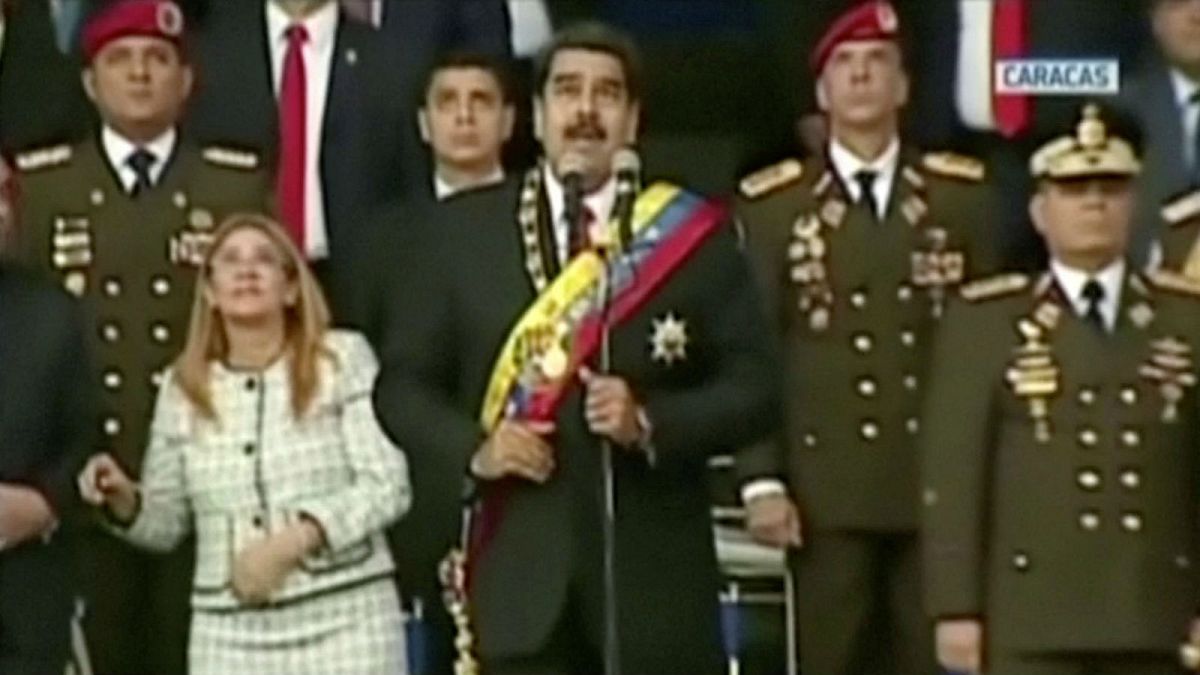Euronews takes a look at what we know about the 'drone attack' on Venezuela's President Nicolas Maduro.
"It's time for economic recovery and we need..." These were the last words spoken by Venezuelan President Nicolás Maduro before a loud bang interrupted a speech on Saturday, during the 81st anniversary of the National Guards.
Maduro's wife, Celia Flores, looked upwards and flinched. Hundreds of uniformed soldiers then scattered and the state TV broadcast was abruptly cut.
According to the government and three witnesses, an explosion rocked the military parade in Caracas, close to the presidential stage.
What happened?
Less than an hour after the explosion, Venezuela's Information Minister Jorge Rodríguez said the attack was carried out by a "drone-type flying device that contained an explosive device".
Rodriguez said that several drones detonated near the stage when the leftist leader was wrapping up a speech.
The government said seven soldiers were wounded in what they called an assassination attempt.
However, firefighters at the scene told the Associated Press news agency that the blasts have a more mundane origin, saying they were caused by an exploding gas canister at a nearby apartment block.
But some neighbours from the building said that the block has a boiler system and they saw the arrival of a drone.
Maduro points the finger
Moments later, the Venezuelan president said the first elements of the investigation point to far-right groups in Bogota and Miami.
He also placed the blame on Colombian President Juan Manuel Santos: "I have no doubts. It is the murderous savagery of the Colombian oligarchy", said the president.
Bogota described Maduro's accusation as absurd and baseless. A statement from the foreign ministry said: “It is common that the Venezuelan leader constantly blames Colombia for any type of situation.”
Meanwhile, US National Security Adviser John Bolton said there was “no US government involvement” and even suggested that the incident could have been “a pretext set up by the regime itself”.
Maduro also blamed the Venezuelan far-right, prompting fears of a crackdown on political opponents.
The T-shirt Soldiers
After Caracas launched its first accusations, the little-known group Soldados de Franelas (T-shirt Soldiers) claimed responsibility for the attack.
It said in an unverified claim on Twitter it had planned to fly two drones but snipers shot them down.
"We showed they are vulnerable, the objective was not achieved today, but it is a matter of time," it said.
The group was formed four years ago and was little known until now. It describes itself as uniting members of “the resistance” to Maduro.
Venezuela's government said the T-shirt Soldiers could be linked to a defunct group led by rogue pilot Oscar Pérez. He commandeered a helicopter last year and launched stun grenades at the Supreme Court. The ex-policeman died in January during a confrontation with authorities.
But later in the evening, a new mystery emerged on social media: copies of a communiqué attributed to an operation calling itself 'Operation Phoenix'.
On Saturday night, Venezuelan journalist Patricia Poleo read on Twitter a statement signed by officers and soldiers who connected Operation Pheonix to the T-Shirt Soldier group.
On Sunday, the government said it had detained six people and had identified all those involved inside and outside the country.
Framed attack?
There were unconfirmed reports that journalists at the event had their cameras confiscated. The lack of images at the parade makes it difficult to know precisely what happened.
Former Venezuelan defence minister Fernando Ochoa Antich said in an interview with the Colombian radio station W Fin de Semana, that he had "the impression", but was not certain that the Maduro government was behind the attack.
Allied countries of Venezuela such as Nicaragua, Iran, Cuba, Bolivia, Syria, and Russia have not questioned the narrative of events laid out by Maduro.
"The assassination attempt against President Nicolás Maduro is an attack against the dignity of our peoples," said the ambassador of Venezuela in Nicaragua, Francisco Javier Arrúe.
The leader of the FARC, Rodrigo Londoño, also rejected the attack and blamed the fact on the far right.
According to the former leader of the rebel group 'Timochenko', those responsible for what happened in Caracas "are the same ones who tried to prevent, with the assassination, the electoral triumph of (`Hugo) Chávez" and who now exported the "coup model to Central America".
